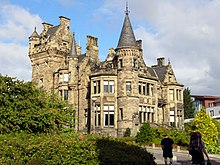St Trinnean's was a progressive girls' school in Edinburgh.[1]


It was founded in 1922 by its headmistress, Catherine Fraser Lee, who followed the Dalton Plan so that pupils could study what they wished and there was no homework.[2][3] It was located at 10, Palmerston Road – the former home of Horatius Bonar – a minister and prodigious hymn writer.[4] In 1925, it relocated to the grand mansion of St Leonard's Hall which had been built for the wealthy publisher, Thomas Nelson. In 1929, it had 122 day children and 38 boarders – pupils who lived at the school.[1] When the Second World War broke out in 1939, the school evacuated to New Gala House – a mansion in Galashiels.[5] Its pupils at that time included Jewish refugees of the Kindertransport.[6] After the war, the school closed when Miss Fraser Lee retired in 1946.[3]
The school uniform was a pale blue tunic with fawn-coloured stockings and coat of Harris Tweed.[3] The school was named after Saint Ninian, who was also known as Trinnean. The pupils were divided into four houses, which were named after people and places associated with the saint – Clagrinnie, Kilninian, Monenn and Whithorn.[7] Each pupil wore a tie in the colour of their house – Kilninian was green, for example.[8]
Reunions of old pupils were held. When one was advertised in 1955, the name of the school was misprinted causing confusion with Ronald Searle's parody, St Trinian's School, which had been recently filmed as The Belles of St. Trinian's. The headmistress issued a denial that her girls were anything like those depicted by Searle.[9] She was not happy with his portrayal, which had first appeared in 1946, when she told the school that, "After 20 years at St Trinneans, I am broken-hearted."[3]
Pupils edit
- Cecile McLachlan née Johnston, the artist who became friends with Ronald Searle as a girl and so inspired his creation of the fictional St Trinians[2]
- Helen Lillie – "It was always freezing cold and coldness seemed to be regarded as an aid to learning ... Miss Fraser Lee was as implacable a dictator as any in Europe in the 1930s."[10]
- Jean Innes, one of the first pupils – "School days at St Trinnean's really were the happiest of my life."[10]
- Joan Campbell – the doctor and former head girl who organised a reunion of nearly 100 pupils in 1998[3]
- Mair Eleri Morgan Livingstone née Thomas, who would climb from the school dormitory to the roof and, later, became a doctor and bacteriologist[11]
- Margaret Hollister, daughter of American missionaries to China, who became a social worker in Washington, DC.[8][12]
- Pauline Harrison, crystallographer[13]
References edit
- ^ a b The Handbook of Private Schools, vol. 13, Porter Sargent, 1929, p. 647,
Enrollment: Boarding 38, Day 122. This school, conducted along progressive lines, has entirely abolished home work for children. Self government prevails.
- ^ a b "Cecile McLachlan; Artist, teacher and inspiration for St Trinian's", The Herald, 23 October 2009
- ^ a b c d e Stephen Goodwin (23 October 1998), "Revealed: belles of the real St Trinians", The Independent, archived from the original on 24 May 2022
- ^ 10 Palmerston Road, Historic Environment Scotland, 15 January 1992
- ^ The Rough Guide to Scotland, Rough Guides UK, 2014, p. 193, ISBN 9781409372257
- ^ Frances Williams (2014), The Forgotten Kindertransportees: The Scottish Experience, A&C Black, p. 55, ISBN 9781780937182
- ^ Malcolm Cant (1990), Edinburgh: Sciennes and the Grange, Donald, p. 156, ISBN 9780859762533
- ^ a b Margaret Hollister (2010), Inheriting China, Washington: Eastern Branch Press, ISBN 9780578070698
- ^ Shan Ross (4 January 2012), Tears at St Trinian’s as creator Ronald Searle dies
- ^ a b "No hockey, jolly or otherwise", The Northern Echo, 21 August 2002
- ^ "Mair Eleri Morgan Thomas", British Medical Journal: 350, 18 May 2015, doi:10.1136/bmj.h2627
- ^ "Margaret Hollister", The Washington Post, 25 January 2019
- ^ Elizabeth Sleeman, ed. (2001), The International Who's Who of Women 2002, Psychology Press, p. 235, ISBN 9781857431223